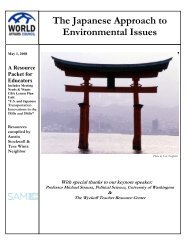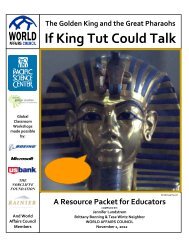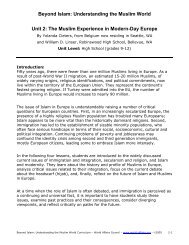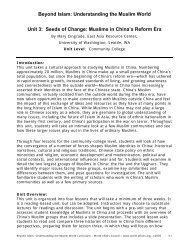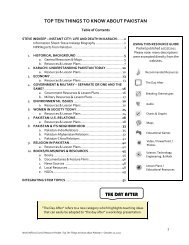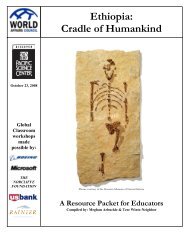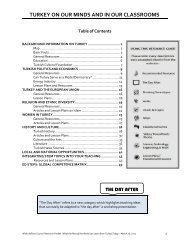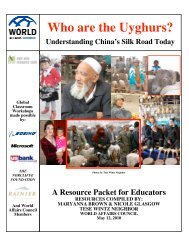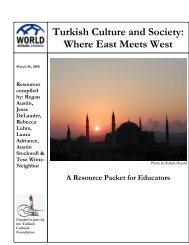The Question(s) of Tibet - World Affairs Council
The Question(s) of Tibet - World Affairs Council
The Question(s) of Tibet - World Affairs Council
Create successful ePaper yourself
Turn your PDF publications into a flip-book with our unique Google optimized e-Paper software.
HIS HOLINESS THE 14 TH DALAI LAMA<br />
NOTE: For a list <strong>of</strong> books by and about the Dalai Lama see page 5o.<br />
HIS HOLINESS THE 14TH DALAI LAMA OF TIBET<br />
http://www.dalailama.com/<br />
Welcome to the <strong>of</strong>ficial website <strong>of</strong> the Office <strong>of</strong> His Holiness the 14th Dalai Lama. His Holiness<br />
is both the temporal and the spiritual leader <strong>of</strong> the <strong>Tibet</strong>an people. He frequently states that his<br />
life is guided by three major commitments: the promotion <strong>of</strong> basic human values or secular<br />
ethics in the interest <strong>of</strong> human happiness, the fostering <strong>of</strong> inter‐religious harmony and the<br />
welfare <strong>of</strong> the <strong>Tibet</strong>an people, focusing on the survival <strong>of</strong> their identity, culture and religion.<br />
Explore here how His Holiness fulfils these commitments through his various activities his<br />
public talks, teachings, widespread international visits and publications.<br />
THE NEW YORKER: THE NEXT INCARNATION (10/4/10)<br />
http://www.newyorker.com/reporting/2010/10/04/101004fa_fact_osnos<br />
Osnos pr<strong>of</strong>iles the Dalai Lama XIV. His Holiness recently celebrated his 75th birthday in<br />
Dharamsala, India, the town in which he has lived in exile for the past 50 years. A discussion <strong>of</strong><br />
the political strife between <strong>Tibet</strong>ans and the Chinese government is also presented.<br />
THE NEW YORK REVIEW OF BOOKS: A HELL ON EARTH (3/9/09)<br />
http://www.nybooks.com/articles/archives/2009/apr/09/a‐hell‐on‐earth/?page=1<br />
Over the decades I’ve known him, the Dalai Lama has always been adept at pointing out,<br />
logically, how <strong>Tibet</strong>’s interests and China’s converge—bringing geopolitics and Buddhist<br />
principles together, in effect—and at arguing, syllogistically, for how the very notion <strong>of</strong> enmity<br />
is not only a projection, nearly always, but, in today’s globally interconnected world, an<br />
anachronism. But now, with the skill <strong>of</strong> one trained for decades in dialectics and personally<br />
familiar with the last few generations <strong>of</strong> Chinese history, he seems more and more to be<br />
holding the Chinese government up against its own principles. “Chairman Mao, when I was in<br />
Peking, said, ‘<strong>The</strong> Communist Party must welcome criticism. Self‐criticism as well as criticism<br />
from others,’” he noted pointedly in Tokyo. But now the Party seemed to be all mouth and no<br />
ears. Deng Xiaoping, he reminded another audience, always stressed “seeking truth from<br />
facts,” the very empiricism the Dalai Lama would love to see more thoroughly deployed. “When<br />
President Hu Jintao talks <strong>of</strong> a ‘Harmonious Society,’ I am a comrade <strong>of</strong> his,” he told the Chinese<br />
scholars. “Even today I have points <strong>of</strong> agreement with Marxist thought.”<br />
TIME: A MONK’S STRUGGLE (3/19/08)<br />
http://www.time.com/time/world/article/0,8599,1723<br />
922,00.html<br />
…I'm not a Buddhist myself, only a typically skeptical<br />
journalist whose father, a pr<strong>of</strong>essional philosopher,<br />
happened to meet the Dalai Lama in 1960, the year<br />
after he went into exile. But having spent time<br />
watching wars and revolutions everywhere from Sri<br />
Lanka to Beirut, I've grown intrigued by the quietly<br />
revolutionary ideas that the Dalai Lama has put into<br />
play. China and <strong>Tibet</strong> will long be geographic<br />
Among fellow Buddhists, the Dalai Lama delivers complex,<br />
analytical talks and wrestles with doctrinal issues within a<br />
philosophy that can be just as divided as anything in<br />
Christianity or Islam, but he has decided after analytical<br />
research that when he finds himself out in the wider world<br />
talking to large audiences <strong>of</strong> people with no interest in<br />
Buddhism, the most practical course is just to <strong>of</strong>fer, as a doctor<br />
would, simple, everyday principles that anyone, regardless <strong>of</strong><br />
religion (or lack <strong>of</strong> same), might find helpful. Since material<br />
wealth cannot help us if we're heartbroken, he <strong>of</strong>ten says, and<br />
yet those who are strong within can survive even material<br />
hardship (as many monks in <strong>Tibet</strong> have had tragic occasion to<br />
prove), it makes more sense to concentrate on our inner, not our<br />
outer, resources. We in the privileged world spend so much time<br />
strengthening and working on our bodies, perhaps we could also<br />
use some time training what lies beneath them, at the source <strong>of</strong><br />
our well‐being: the mind.<br />
<strong>World</strong> <strong>Affairs</strong> <strong>Council</strong> Teacher Resource Packet – <strong>The</strong> <strong>Question</strong>(s) <strong>of</strong> <strong>Tibet</strong> February 28, 2011<br />
8



